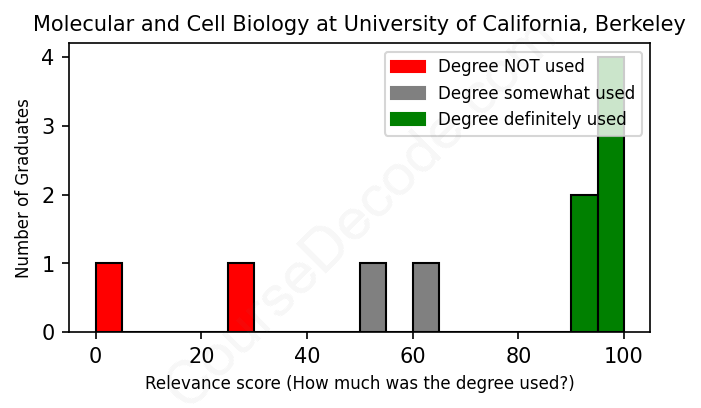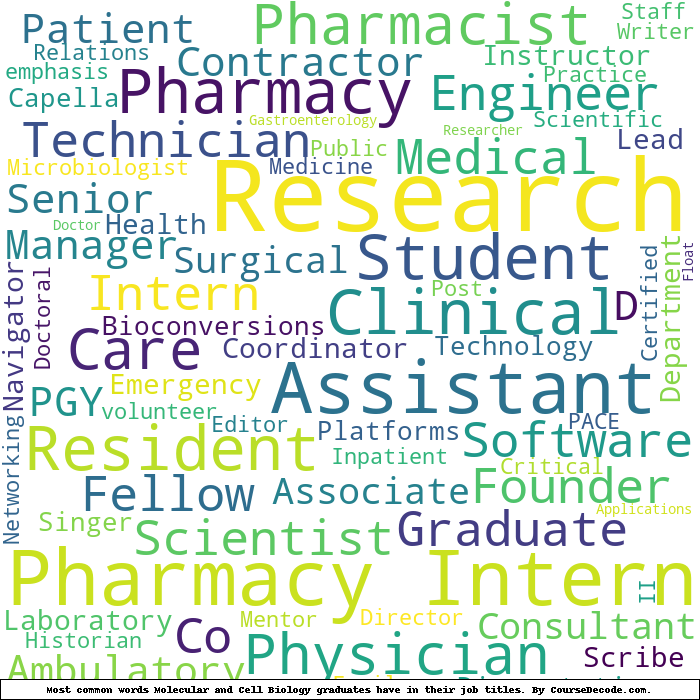
First, some facts. Of the Molecular and Cell Biology graduates from University of California, Berkeley we've analyzed , here's how many have used (or NOT used) their degree in their career:

These are estimates based on AI analysis of 10 LinkedIn profiles (see below).
The verdict? Slightly above average. Overall, with an average relevance score of 72%, Molecular and Cell Biology graduates from University of California, Berkeley have a slightly higher likelihood (+5%) of finding work in this field compared to the average graduate across all fields:
And for comparison, here's the chart for all profiles we've looked at across all degrees.
Also, after graduating, 70% of these graduates have pursued further education other than another Bachelor's degree (such as a Masters degree or other), compared to the average across all profiles of 35%. This suggests you may need more than just a Bachelors degree to be competitive as a Molecular and Cell Biology graduate.
See the details:
|
Relevance score: 61% We think this person has gone into a career only somewhat relevant to their degree. We think this person has gone into a career only somewhat relevant to their degree.
DEGREE INFOGraduated in 2017 from University of California, Berkeley with a Bachelor of Arts (B.A.) in Molecular and Cell Biology. Also pursued further education since (see below). JOB HISTORY SINCE GRADUATIONStaff Research Associate University of California, San Francisco Jun 2017 - Jul 2020 Mentor  Health Professions Recruitment and Exposure Program (HPREP) at Harvard Medical School Oct 2021 - Feb 2022 Scientific Writer and Editor  Anshin BioSolutions Corp. May 2023 - Present Director of Networking  GSAS Harvard Biotech Club Dec 2022 - Present FURTHER DEGREES DONE SINCE GRADUATINGDoctor of Philosophy - PhDHarvard University 2020 - 2025 ABOUTNo information provided. |
The top 10 most common jobs done by the graduates we've analyzed (ranked most common to least) are:
From the LinkedIn profiles of graduates from the University of California, Berkeley with degrees in Molecular and Cell Biology, it seems like many of them have landed jobs in the healthcare field, particularly as doctors, researchers, and interns. Positions like Surgical Residents, Gastroenterology Fellows, and Clinical Research Assistants reflect a strong connection to the knowledge they acquired during their studies, allowing them to apply their understanding of biological systems to real-life medical challenges. Additionally, roles like Post-Doctoral Fellows and Research Associates are great examples of direct, relevant applications of their degree, as they dive deep into research that stems from molecular and cellular biology concepts.
On the flip side, there are also quite a few graduates who veered off into less directly related roles, especially in areas like software engineering or pharmacy. Some of these positions don’t tap into their molecular and cell biology training as much. For example, Software Engineers at companies like Uber won’t find much overlap with biology in their daily tasks. So, while many jobs do keep a strong connection to the core principles learned in their degree, it’s clear that not every graduate is using their molecular biology knowledge directly in their careers. Overall, it looks like there’s a mix of relevant and less relevant roles out there for these graduates, but the trend leans more toward jobs that relate closely to their field of study, especially in healthcare and research domains.
Here is a visual representation of the most common words in job titles for Molecular and Cell Biology graduates (this is across all Molecular and Cell Biology graduates we've analyzed, not just those who went to University of California, Berkeley):

Looking at the career trajectories of graduates from the Molecular and Cell Biology program at UC Berkeley, it seems like many of them kick-start their careers with roles that are research-oriented or directly related to the medical field. For instance, a lot of these graduates land positions as research assistants, interns, or pursue further studies in medical residency or graduate programs shortly after graduating. This initial focus on research and healthcare showcases the strong foundation they gain during their studies, which often leads them to relevant jobs right out of college. For example, individuals have taken on roles in prestigious institutions like Stanford, UCSF, and various healthcare organizations, which indicates a clear pathway into the biomedical field.
Fast-forwarding five to ten years, many of these graduates continue to advance in healthcare-related careers, often becoming specialists, doctors, or taking on significant roles in research and technology. Some have transitioned into more unexpected fields, like software engineering within biotech companies, which shows versatility. While there are a few who have moved away from biological sciences, the overall trend points toward successful careers in medicine, research, or related sectors. So, if you're considering this degree, it definitely seems to set a solid stage for a rewarding career, whether you stick with the lab bench or decide to branch out into another industry later on.
Honestly, a Bachelor’s degree in Molecular and Cell Biology at UC Berkeley can be pretty challenging. The coursework is rigorous, with a heavy emphasis on chemistry, biology, and lab work, and you're going to need to really dig into the material and keep up with a lot of details. Berkeley's reputation adds an extra layer of intensity since you're surrounded by some very sharp fellow students, which can make everything feel more competitive. If you enjoy science and are really motivated, it can be rewarding, but don't be surprised if you find it tougher than the average degree. Just be ready to put in the time and effort!
Most commonly, in the LinkedIn profiles we've looked at, it takes people 4 years to finish a Bachelor degree in Molecular and Cell Biology.
So, looking at these UC Berkeley grads in Molecular and Cell Biology, it kinda seems like they’re doing pretty well for themselves overall, especially those who went into medicine or tech. The ones who pursued medical careers are likely earning decent salaries, considering how much doctors and fellows typically make—plus they’ve got some solid experience under their belts. On the other hand, the ones who pivoted to tech, like the software engineers, are probably pulling in good pay too, especially at companies like Uber. The earlier graduates seem to have more traditional career paths in research and clinical roles, while the more recent ones are still getting their footing, so their finances might not be as established yet. But overall, it looks like most of them are set up for decent earnings, especially as they keep advancing in their careers!
Here is a visual representation of the most common words seen in the "about" section of LinkedIn profiles who have a Bachelor degree in Molecular and Cell Biology (this is across all Molecular and Cell Biology graduates we've analyzed, not just those who went to University of California, Berkeley). This may or may not be useful:

Here are all colleges offering a Bachelor degree in Molecular and Cell Biology (ordered by the average relevance score of their Molecular and Cell Biology graduates, best to worst) where we have analyzed at least 10 of their graduates:
| College | Score | Count |
|---|---|---|
 University of California, Berkeley University of California, Berkeley
|
72 | 10 |